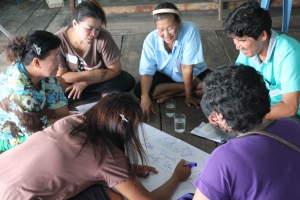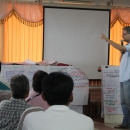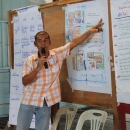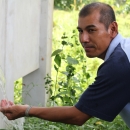Newsroom :: Events :: 2011 :: MFF supports fisher community in Thailand to take action for climate change adaptation
MFF supports fisher community in Thailand to take action for climate change adaptation
Location: Bang Chan Village 2, Chanthaburi Province, Thailand. 21st Oct 2011 to 23rd Oct 2011
The fisher community of Bang Chan Village 2 traditionally lived along the mangrove channels on the eastern coast of Thailand. However, once their land became a protected mangrove area, they lost their entitlements and have become one of Thailand’s marginalized fisher communities with very limited infrastructure including restricted access to drinking water. The community collects rainwater during the monsoon season, but must rely on purchasing water during the other eight months of the year. The impacts of a changing climate are predicted to become more severe as the dry season is likely to be longer and drier.SDF has been working with these communities of the Bang Chan sub-district since early 2011, as an implementing partner of IUCN’s Building Resilience to Climate Change Impacts―Coastal Southeast Asia Project. MFF supports this project with a tailored workshop manual to Promote Local Innovations (PLI) for climate change adaptation.
During the three-day workshop the participants made an in depth analysis of the drinking water problem, discussed their vision and brainstormed on possible local innovations that would bring them a little bit closer to the village of their dreams. On the second day they visited a village that has successfully established their own water management system. With the experts from SDF, IUCN, MFF and Mahidol University, the workshop participants discussed the technical, ecological, social, economic and cultural aspects of the system used by the other village.
The output of the workshop is a jointly designed action plan with clearly defined activities, responsibilities and timeframes to undertake further feasibility studies for: improved rainwater harvesting and storage; sustainable use of freshwater aquifers; and desalination equipment. Furthermore, the workshop opened a dialogue among the different stakeholders present at the workshop and built a basis for mutual trust among the community members and that the external participants. This key feature of the PLI process has assisted integration of the community’s priorities in an interactive and participatory way, and empowers the community to take their own action for climate change adaptation.




